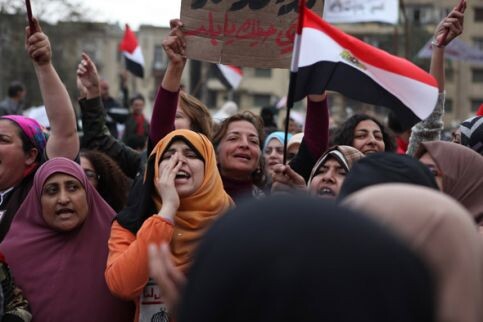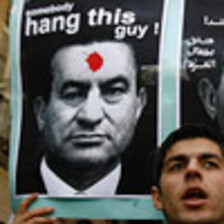The Electronic Intifada 13 February 2011

Egyptian women demonstrate at Cairo’s Tahrir Square (Matthew cassel)
CAIRO (IPS) - Asmaa Mahfouz, a 26-year-old Egyptian woman who two weeks ago had only one name, now boasts at least three. These include “A woman worth 100 men,” “The girl who crushed Mubarak” and “The leader of the Egyptian revolution.”
Mahfouz, who began online political activism in 2008, is now credited for launching a video call that sparked the revolution against the autocratic military rule of US-backed President Hosni Mubarak.
Mahfouz is a member of a new lot of Arab women activists who are shedding their typical conservative image to lead or inspire a wave of pro-democracy protests that are reshaping the political future of several countries in the Arab world.
Mahfouz created a YouTube video in mid-January in which she urged “all young men and women” to leave their computer screens and converge on the streets of Egypt to protest the brutal and corrupt rule of the 82-year-old Mubarak.
“I am a woman and I am going out on 25 January and am not afraid of the police,” she said a few days before the unrest broke out. “For the men who brag of their toughness, why exactly are you not joining us to go out and demonstrate?”
Her message reverberated, she said, “beyond the wildest of dreams.”
The 4-minute, 30-second video was shared widely by Internet activists and was posted on many blogs and websites. Young people forwarded it on mobile phones - a communications tool that some 65 million Egyptians use. Soon after, the government blocked all mobile phone networks.
“I had hoped 25 January would gather 10,000 people at best, but I later realised after the police force withdrew and collapsed, that our day of protests turned into a popular revolution,” she said on a Facebook page created for her by her supporters.
“My family was so worried about me and they told me women are not harsh enough for that kind of confrontation,” Mahfouz said. “They now tell me they are so proud of me. I knew that if I get scared and everybody gets scared, then this country will be lost for good.”
Mahfouz’s words resonated not only in Egypt, but across the region.
“Asmaa’s words were sincere and came out of the heart,” wrote Reem Khalifa, a columnist for the Bahrain newspaper Alwasat. “Her words turned into a tsunami, wrecking havoc with despotism, tyranny and injustice.”
Asmaa Mahfouz is among millions of women taking the lead during protests in Egypt and elsewhere in Arab countries.
In Cairo, women with sticks and iron bars in hand were patrolling some of the streets with their male relatives during the days of looting and vandalism that swept the city after the collapse of the Egyptian police force.
Mothers of several people who died in the initial days of the protests have refused to receive condolences or hold funeral ceremonies until the revolution achieves its main goal of ousting the regime of Mubarak.
The mother of Khaled Said, an Internet activist who was beaten to death by police officers in Alexandria last year, joined the protesters in Tahrir and repeatedly urged them not to go home before Mubarak leaves office.
Women have visibly been in the forefront in demonstrations at Tahrir Square and other places - in a society where women traditionally have taken a back seat. Many volunteered to do body searches of other women taking part in the protests — it had become clear that the regime could sneak in weapons to be used against the protesters.
Across the Arab world, women have stepped into the forefront of dangerous anti-regime protests.
In Tunisia, human rights leader and blogger Lina Ben Mehenni was among the first to get word out about the Tunisian protests early in December through her tweets and blogs — despite police threats.
The poor mother of Mohammed Bouazizi, the young street hawker who set himself ablaze starting the Tunisian revolution in mid-December, was also doing her share, calling for change. Her sincere tears and wishes for justice galvanized hundreds of thousands of impatient Tunisians to eventually remove the country’s long time dictator Zine el Abidine Ben Ali. The video of her tears went viral in the Arab world.
In Yemen, another country that has seen major anti-government protests, young woman activist Tawakul Abdel-Salam Karman was leading the charge.
It was 30-year-old Karman’s arrest by President Ali Abdullah Saleh’s regime that set off days of major street demonstrations that threatened his hold on power. Karman, who is now free, remains one of the country’s most outspoken critics of the regime.
“The Arab world is in revolt against dictatorships,” Magda Adly, of the El Nadim Center for the Rehabilitation of Victims of Violence in Cairo, told IPS. “That’s why we see women, Islamist or not Islamist, veiled or not veiled, coming together and leading what’s happening on the ground. This is real equality and we’ll never go back to square one.”
All rights reserved, IPS - Inter Press Service (2011). Total or partial publication, retransmission or sale forbidden.
Related Links





